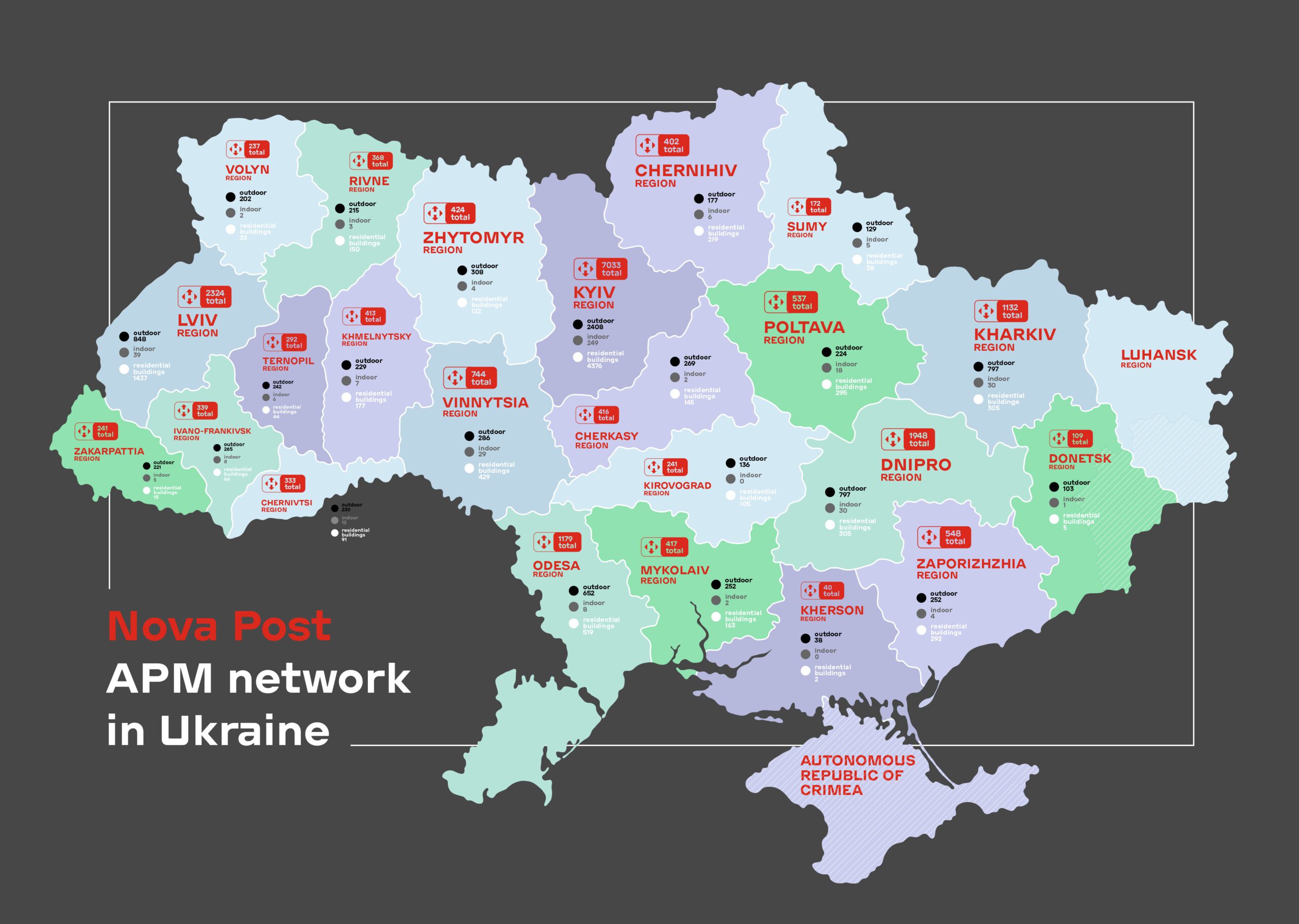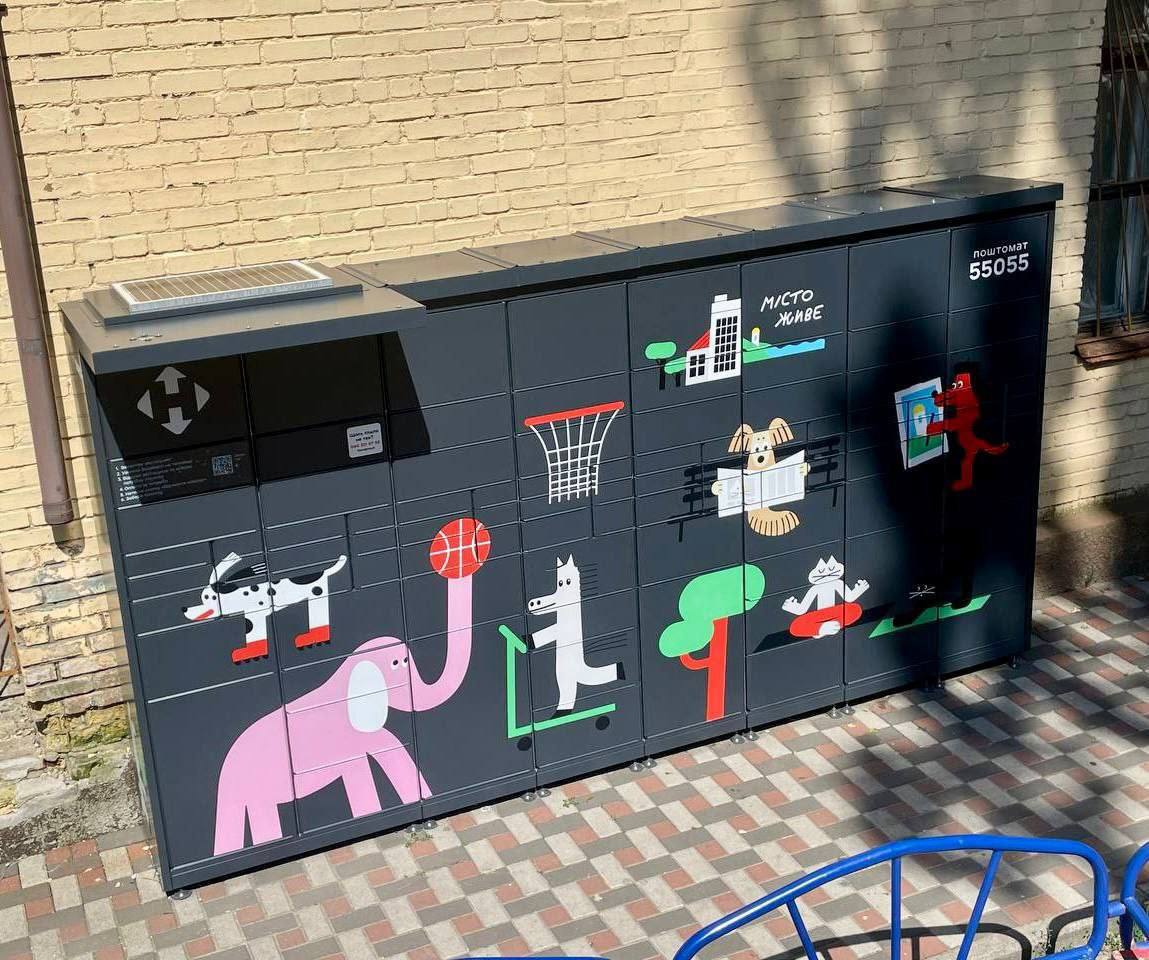In today’s fast-paced logistics landscape, the ability to offer consumers quick and convenient parcel services is more important than ever. Automated Parcel Machines (APMs) are becoming a central part of this evolution, providing self-service options for sending and receiving parcels that save time for consumers and streamline operations for logistics companies.
As e-commerce continues to grow, particularly post-pandemic, the demand for flexible, user-friendly delivery solutions has surged. APMs offer a solution that addresses this shift, allowing consumers to pick up their packages at their convenience without waiting for a courier. This added flexibility is one reason APMs are becoming a critical component of the logistics chain.
The Rise of Ukraine in the European APM Market
While observers will typically discuss players such as InPost, GeoPost (La Poste), PostNord or Deutsche Post & DHL as the one key network is often left below the radar screen. In fact Europe’s second largest network is not in the UK, France, Germany or the Nordics, but in Ukraine. Nova Post, Ukraine’s largest logistics provider has quietly and successfully,. despite operating in the midst of a full-scale war,developed a network, now boasting almost 20,000 parcel lockers, making it the second-largest APM network in Europe, trailing only InPost in Poland (with some 23,000 APM’s) and surpassing Deutsche Post (DP) and pretty much everyone else; this is a notable achievement given the company’s circumstances.

Nova Post’s parcel lockers are located in shopping centers, petrol stations, and residential buildings, allowing customers to send and receive parcels 24/7. The company introduced the option to send parcels via APMs during the war in Ukraine, responding to the growing demand for self-service options. Customers can manage parcel deliveries online through a variety of digital tools, such as Nova Post’s website, a multilingual mobile app, or a business account. These digital solutions provide flexibility and convenience for individuals and businesses alike, making it easy to place orders without visiting a physical location.
The Role of APMs in Sustainable Logistics
As is the case elsewhere, Ukraine’s APMs also offer several environmental benefits. By reducing the need for door-to-door deliveries, APMs help cut down on carbon emissions and reduce traffic congestion. This makes them an attractive option for companies looking to lower their environmental footprint while continuing to serve an increasingly e-commerce-driven consumer base.
Parcel lockers also enable parcel consolidation, helping logistics operators optimise delivery routes and reduce operational costs. Fewer trips to individual homes or businesses mean a smaller carbon footprint per delivery, aligning with the growing push for more sustainable logistics practices.
Of the 19 700 APMs operated by Nova Post, all of them run without electricity, being powered by special rechargeable batteries. In 2023, the company installed 1853 APMs, in 2024 this amount rose to 2800 parcel lockers, 250 of them are solar-powered. Nova Post ensures continuous service even in adverse conditions—batteries allow APMs to function for several days during blackouts or shelling, a necessity given the challenges faced during the ongoing war in Ukraine.

War Necessitated Innovations
While APMs are becoming a standard feature of the logistics landscape, Nova Post’s journey is particularly unique. Operating under wartime conditions has required the company to adapt quickly. The war in Ukraine brought significant logistical and safety challenges, from maintaining infrastructure to keeping staff safe. Despite these obstacles, the Ukrainian logistics operator has not only maintained its domestic network but expanded its reach across Europe, opening access to their network to people from 15 European countries.
The war has fundamentally changed how Nova Post operates. One key lesson the company has learned is the importance of making decisions quickly. With conditions shifting daily, Nova Post had to keep its finger on the pulse to make fast yet balanced decisions. For example, when it became clear that power outages would be an ongoing problem, the company rapidly upgraded its APM network with rechargeable batteries, ensuring the system could continue to operate even in the event of blackouts.
Another vital lesson has been the importance of building strong relationships with stakeholders. Transparent communication and careful planning, including for worst-case scenarios, have become central to Nova Post’s strategy. The company has responded to customer feedback to enhance services, such as introducing the “Shipping without packaging” feature. This service allows customers to drop an item in the APM without packaging or labeling; Nova Post’s couriers then pack and label the item based on the customer’s online order.
Expanding Footprint and Services
As e-commerce continues to dominate the retail landscape, the demand for quick, convenient, and eco-friendly delivery solutions will only increase. APMs will remain a key part of this shift, offering a scalable and efficient way to handle growing parcel volumes without putting additional strain on traditional delivery networks.
In 2023, Nova Post installed 500 parcel lockers near its own branches. These lockers are serviced differently from the rest of the APM network. Instead of car couriers visiting the APMs multiple times per day, parcels are delivered by the same trucks that supply the branches, and branch employees handle the lockers. This integration allows Nova Post to offer even more convenience to customers while optimizing its logistics network.
Nova Post’s ongoing expansion of its APM network reflects its commitment to innovation and customer satisfaction. As consumer demand for flexible delivery options rises, especially in urban areas, the role of APMs will continue to grow.
Food for Thought
The rapid expansion of APM networks across Europe signals not just a response to modern consumer demands, but a fundamental transformation in the logistics landscape. By providing a more flexible, convenient, and sustainable alternative to traditional courier services, APMs are poised to redefine parcel delivery for the future. Moreover, in the case of Ukraine, APM’s have become a real lifeline to the civilian population.
What’s particularly striking is how countries like Poland and especially Ukraine, which is often overlooked in last-mile innovation, are now leading the charge, surpassing more established logistics markets like the UK, France, and Germany. Much like the electric vehicle revolution, Europe now faces a critical inflection point: adapt or fall behind. Companies like InPost and Nova Post are paving the way, offering a blueprint for the rest of Europe to follow—if they have the foresight to seize the moment. The race to the next generation of delivery has begun, and only the most forward-thinking markets will thrive.
What about Spain?
In April, Nova Post launched its services in Spain, offering fast and easy delivery of documents, parcels, and cargo up to 1,000 kg. Clients can send items across Spain, to other European countries, or directly to and from Ukraine. Nova Post has six postal branches in Spain — in Barcelona, Valencia, Alicante, Torrevieja, and Malaga — and delivers to 13,380 partner parcel lockers, 1,346 APM points, or directly to any address via courier.
Check out more details on first class delivery by the link: https://www.theolivepress.es/spain-news/2024/10/21/first-class-delivery-as-the-ukraine-war-intensified-nova-post-decided-to-branch-out-and-follow-its-citizens-to-spain/








